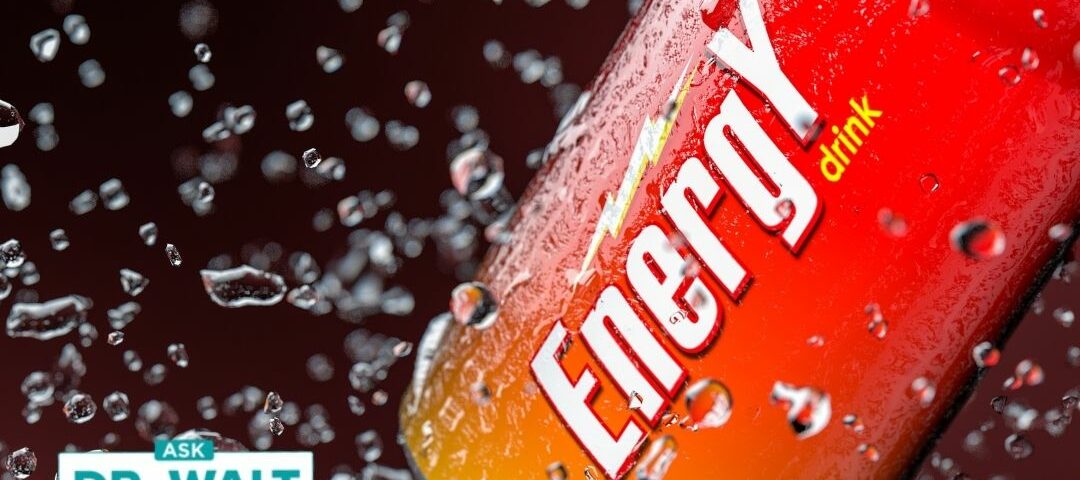Thursday Ask Dr. Walt – What about energy drinks?

Exercise boosts brain function in kids with obesity
October 26, 2022
Tomorrow, Saturday, October 29, is the DEA National RX Take-Back Day
October 28, 2022Dear Dr. Walt, I’m leery of all these energy drinks and shots my teenage grandchildren drink all the time. The kids feel they get an extra boost of energy and like the taste. Are there any dangers to them? —A Bit Weary in West Virginia
Dear Fatigued,
Most people have times when they feel they can benefit from an energy boost. Many supplements are widely advertised to help increase energy and decrease fatigue. As a result, energy drinks and shots have become hugely popular. Despite FDA scrutiny regarding the safety of these beverages, sales are soaring. Next to multivitamins, energy drinks are the most popular dietary supplement consumed by American teens and young adults.
The terms energy drink and energy shot refer to caffeine-containing beverages. Besides providing high levels of caffeine, these drinks frequently contain added sugars; vitamins, particularly B vitamins; legal stimulants, such as guarana, a plant that grows in the Amazon; taurine, an amino acid that’s in meat and fish; L-carnitine, a substance in our bodies that helps turn fat into energy but does not “burn off” fat; and other popular ingredients including kola nut, ginkgo, and yerba maté.
Energy drinks are sold in containers and sizes similar to ordinary soft drinks, while energy shots are sold in small containers holding two to two and a half ounces of concentrated liquid. One product, 5-hour ENERGY®, has the ‘energy shot’ market cornered with none of the others anywhere in the same universe. However, in most cases, neither energy drinks nor energy shots deliver much real energy (i.e., calories). Instead, what they provide is stimulation, primarily due to their significant caffeine content.
According to the FDA, 400 mg per day is the amount of caffeine “not generally associated with dangerous, negative effects” for healthy adults. Anything over that amount could potentially cause serious problems in adults and certainly children and adolescents. With most products, you can easily exceed your 400 mg of caffeine per day with two energy drinks or two energy shots.
Besides the caffeine in energy drinks, most contain 54 to 62 grams of added sugar (equal to about 15 teaspoons of added sugar) which exceeds the maximum amount of added sugars recommended for an entire day, which is six teaspoons per day for women and nine for men.
Energy drinks usually contain B vitamins; however, since few people are deficient in B vitamins, these added vitamins are likely to provide no benefit and may put you at risk for exceeding upper tolerable intake levels (ULs) for these vitamins—levels above which there is increased risk of toxicity.
Studies show some energy drinks or shots may help you stay alert or even improve athletic performance. However, researchers now believe that the positive effects of the products are related to caffeine which can more safely be taken in coffee or teas at caffeine levels below 400 mg per day.
Also, studies show that frequent use (two times or more per day) or ingestion of more significant amounts (twenty-four ounces or more per day) of energy drinks was associated with a doubling or tripling of aggressive behaviors. Also, mental health problems (including sleep problems, depression, anxiety, post-traumatic stress disorder, and alcohol misuse) were significantly more common as compared to those who ingested no or few energy drinks. Interestingly, energy drink use was also associated with fatigue—likely due to inadequate sleep.
Energy drinks are also associated with increased cardiovascular issues including altering the heart’s electrical activity and elevated blood pressure. The effects are generally considered mild, however, people who take certain medications or have a specific type of heart condition could
be at increased risk of fatal arrhythmia, or irregular heartbeat.
Studies are showing that the number of energy drink-related visits to emergency departments is increasing rapidly. An online survey of over 2,000 adolescents and young adults reported of those who had ever consumed an energy drink or shot, over half had at least one adverse reaction. The American Beverage Association stands by the safety of energy drinks, pointing out that many of their ingredients are also found in everyday foods, but health experts, like the World Health Organization, disagree, saying that energy drinks “may pose danger to public health.”
For sure, certain groups for which energy drinks and shots could be potentially dangerous would include those under 18, women who are pregnant or breastfeeding, people who have a caffeine sensitivity or don’t consume caffeine on a regular basis, individuals taking stimulants or other caffeine-based medications, like Adderall for attention deficit hyperactivity disorder, and those with cardiovascular or mental health conditions. Certainly, people in any of these categories should talk to their family physician before consuming even small amounts of these products.
© Copyright WLL, INC. 2022. This blog provides healthcare tips and advice that you can trust about a wide variety of general health information only and is not intended to be a substitute for professional medical advice, diagnosis, or treatment from your regular physician. If you are concerned about your health, take what you learn from this blog and meet with your personal doctor to discuss your concerns.



